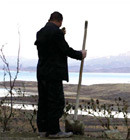Comment
Out of Yuanmingyuan complex
By Yu Deqing (China Daily)
Updated: 2010-01-22 09:17
 |
Large Medium Small |
To mark the disaster that hit the old Summer Palace or Yuanmingyuan Park 150 years ago, a team of experts, sent to the United States to trace and document relics taken from the park, recently held a photo exhibition on their fact-finding trip.
There were two reasons why this trip went smoothly. First, it was a "harmless" journey because its objective was not to bring the historic relics back, but only to collect information that can be used to set up the Yuanmingyuan Park online. It was more like a scholarly endeavor than treasure hunting.
Second, the open attitude of the American museums was also important. Most museums in the US are open to the public free of charge. They consider their collections as the common heritage of all human beings so they have no reason to refuse the request from Chinese colleagues to visit and study.
The park has achieved initial success in tracing its relics overseas. But it is still far from actually bringing back the looted relics. I believe many Chinese are not satisfied with this. It's likely that the information and documents acquired will help build a digital Yuanmingyuan Park.
However, considering that Yuanmingyuan is a symbol of national humiliation, a virtual Yuanmingyuan would not be able to compensate for national humiliation.
Although Yuanmingyuan Park was ruined 150 years ago, the chapter has not closed in terms of compensation for damages done to us. We won't seek revenge by repeating the barbaric acts of the English and French allies, but we may feel compensated only after the relics plundered from the palace are returned to China.
However, people seem to have developed a Yuanmingyuan complex and tend to be over-indulged in telling a sad story as victims. This may lead to a lack of reflection on history.
For example, our current textbooks on the disaster are mainly intended to condemn the English and French invasion armies, without enlightening people on the stupidity of the Qing government to let a small diplomatic row over the emperor's "face" evolve into a major national disaster.
To people haunted by the Yuanmingyuan complex, I don't know the essential difference between their "face" now and the emperor's "face" 150 years ago. Maybe it's time to ask: what else should we be ashamed of from the Yuanmingyuan disaster?
(Excerpts of a commentary that appeared in Beijing News on Jan 21)









